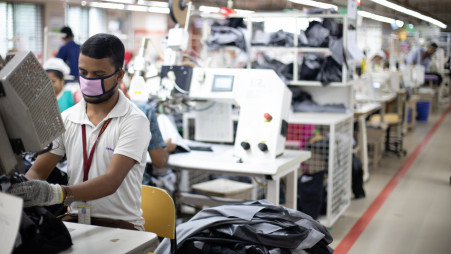Upskilling workers: A need of the hour for the Bangladesh apparel industry
Bangladesh has proved to be the preferred sourcing destination for apparel buyers in today’s uncertain climate. Unfortunately, the demand for workers is exceeding the supply, and skill shortages have become a real problem for the apparel industry

It is common knowledge now that the orders in the Bangladesh apparel industry have bounced back in bundles. Now that shops in Western countries have reopened and normalcy has been restored in people's lives, our apparel factories are crammed with orders.
Some global geopolitical issues have also become beneficial for Bangladesh's apparel industry. Political instability in Myanmar has been causing discomfort for apparel buyers. The economic crisis in Sri Lanka is sweeping out the orders from there to Bangladesh. Ethiopia has proven to be a failed testing case for apparel brands and retailers due to the currently ongoing Tigray War.
So, Bangladesh has proved to be the preferred sourcing destination for apparel buyers in this uncertain climate.
While the opportunities are knocking at our doors from every side, unfortunately, the demand for workers is exceeding the supply, and skill shortages have become a real problem for the apparel industry. Almost all garment factories, especially the small and medium-sized ones, are struggling from an acute shortage of skilled workers. According to the industry authorities, the factories at present are incurring production losses due to a 15-20% shortage of workers.
The industry authorities are attributing the shortage of workers to the sudden rise in demand and massive expansion of production capacity in the apparel industry. Many workers have not returned after they went home following the outbreak of Covid-19 in Bangladesh in March 2020.
However, leaving jobs and not returning to workplaces after the end of the pandemic is a global phenomenon that experts are terming as a "supply chain fiasco". According to a recent survey carried out by Fortune in collaboration with Deloitte, 73% of the CEOs say that labour or skills shortage is the biggest external impediment disrupting their business in 2022.
The shortage of skilled workers is the Achilles' heel for the Bangladesh apparel industry which may affect the recovery of the sector even when the time is ripe. The pertinent question is: What are the ways to fill up the shortage? There is no short-term fix, I believe.
Bangladesh Garment Manufacturers and Exporters Association (BGMEA) has been running a number of training centres to produce skilled workers. Under the supervision of the Finance Ministry, BGMEA is also implementing the Skills for Employment Investment Program (SEIP) project to provide training for the skill development of mid-level managers as well as workers.

But surely this is quite insufficient. More investment and support from the government, development partners, international donors and NGOs are required to reduce the skills gap.
We need a more coordinated skill development strategy for the Bangladesh apparel industry both for workers and mid-level managers. For example, if training centres are set up in rural areas in the northern and southern parts of the country, it could yield good results as our workers mostly come from these regions.
The shortage of skilled workers could be solved to a large extent if we provided unskilled workers with primary training at the district level training centres. We could also ensure job placements at factories through the training centres.
This could reduce the number of unskilled workers migrating to Dhaka and Chittagong.
According to data presented by the Bangladeshi Embassy in Amman, as many as 40,000 Bangladeshi workers are currently employed in the Jordanian garments sector. While our own industry is suffering from an acute shortage of workers, losing our skilled workers to garment factories in Jordan, Mauritius and Malaysia is something that should be stopped by formulating and undertaking a national skill development strategy.
Invariably our apparel industry has largely contributed to the national development and progress of Bangladesh so far. There is no doubt that the industry will continue to be the key driver of our economic growth even after Bangladesh is officially recognised as a developing country in 2024. But to play its due role in Bangladesh's journey towards prosperity, there is no alternative but to fill up the skills gap in the apparel industry and equip our people with the best skills.

Abdullah Hil Rakib is the Managing Director of Team Group. He is also a Director of Bangladesh Garment Manufacturers and Exporters Association (BGMEA).



 Keep updated, follow The Business Standard's Google news channel
Keep updated, follow The Business Standard's Google news channel














